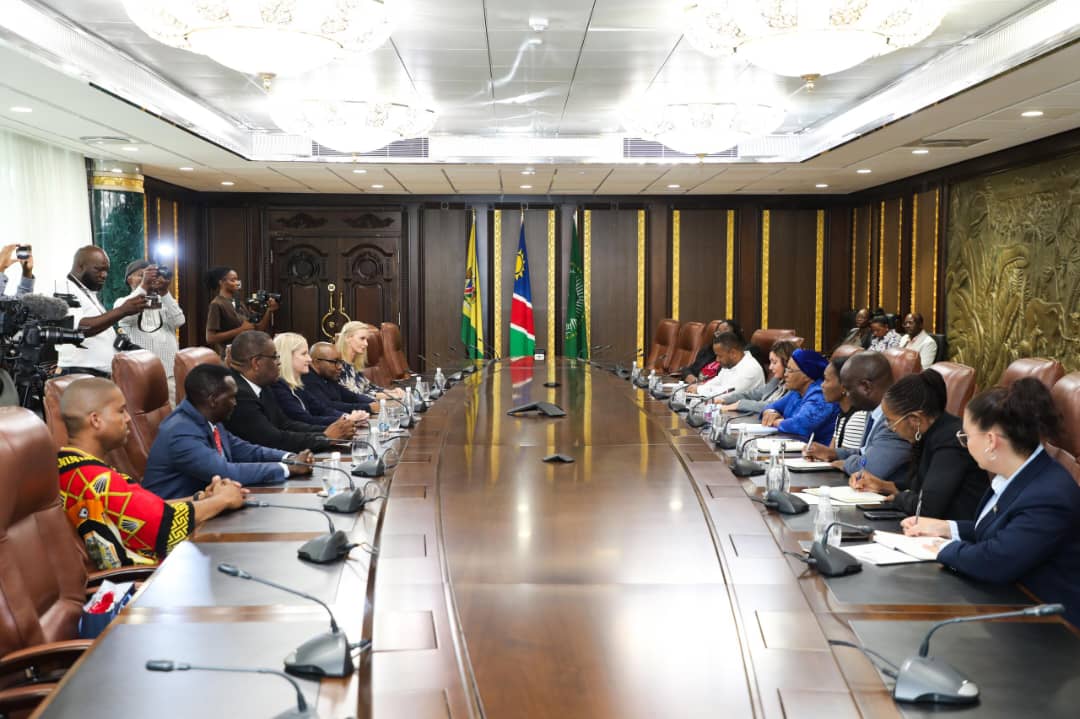A NAMIBIAN-FLAGGED fishing vessel, the Paloma V, faces an international ban after a New Zealand court ruled that it was linked to illegal toothfish fishing in the Antarctic Ocean.
The Paloma V is owned by Omunkete Fishing in Walvis Bay. The vessel might be blacklisted by the Commission for the Conservation of Antarctic Marine Living Resources (CCAMLR), preventing it from entering the ports of 34 countries that are signatories to the commission.Omunkete Fishing’s James van Zyl yesterday pleaded innocence and argued that the charges were related to the vessel’s previous owners.He contends that the issue is linked to Antarctic fishing companies wanting control over the area.According to a statement on the official website of the New Zealand government, Foreign Minister Winston Peters said the vessel wanted to unload toothfish in Auckland in May.Fisheries officers examined the vessel and allegedly found information linking it to illegal, unreported and unregulated fishing.According to that country’s fisheries minister, Jim Anderton, the vessel’s computer records revealed that it had contact with known illegal fishing vessels and had re-supplied them at sea.Peters said Omunkete Fishing took the New Zealand government to court because it wanted to stop it reporting the Paloma V to the CCAMLR, and recommending it be put on the illegal fishing blacklist.”The Omunkete case claimed the in-port vessel search process was flawed but the High Court found in the government’s favour.”As soon as the High Court released its decision, the government filed its CCAMLR report.The recommendation to blacklist Paloma V will be considered at CCAMLR’s annual meeting in October,” Peters stated.Judgement was handed down on July 1, one week before the illegal fishing conference held in Windhoek, at which Namibia, together with seven other coastal countries belonging to the Southern African Development Community (SADC), agreed on tough measures to curb illegal fishing and the landing and marketing of such catches at their ports.Anderton said the outcome of the case confirms the strength of New Zealand’s inspection regime and should send a strong signal to any foreign vessel intending to make use of New Zealand ports for illegal catches.In the meantime, the Paloma V has left New Zealand and docked in Walvis Bay on July 3, where it and offloaded 100 tonnes of frozen toothfish, which will be exported to the United States.Omunkete’s Van Zyl yesterday told The Namibian that the Paloma V was granted a toothfish licence by CCAMLR.He said the whole affair was related “to the vessel’s history”, and that none of the allegations were viable as the vessel was given Namibian ownership in November last year.It was an Uruguay-flagged vessel previously.”The allegations have nothing to do with the vessel now.They are all historical.We definitely have not been involved in any illegal fishing practices,” he said.”This is what we tried to bring over in the High Court proceedings, but it seems as if our argument fell on deaf ears.”Van Zyl claims New Zealand, together with other Antarctic fishing companies, wants control over the area.”The fewer vessels there are, the more they can do with the stocks for themselves,” he said.He said Omunkete Fishing would have to go to October’s convention and state its case in order to avoid being blacklisted, and eventually being put out of business.He said it takes about 25 days to get to the Antarctic Ocean, with the vessel using approximately 5 000 litres of fuel a day.”There will be no point if we travel all the way there, and not be able to offload at the nearest port, but would have to come all the way back – another 25 days at 5 000 litres fuel per day.We’ll go bankrupt,” Van Zyl said.The Director of Fishing Operations of the Namibian Ministry of Fisheries and Marine Resources (and Chairman of CCAMLR), Peter Amutenya, said New Zealand fisheries authorities did act in accordance with their domestic law regarding fisheries, as well as in accordance of CCAMLR regulations.”What the problem really was, and why New Zealand won the case, I really cannot comment on because I would need to receive the details; which I will probably in due course,” he said.”The owners did request permission from us to dock at the New Zealand port, and we did not have a problem with it.There may have been some unfamiliar points in their domestic law that initialised their reaction.”He said two Namibian vessels, the Paloma V and the Antillas Reefer, were granted licences to catch toothfish.Amutenya acknowledged that another Namibian-flagged vessel was being investigated for illegal fishing in Mozambican waters, but would not give more details.The vessel might be blacklisted by the Commission for the Conservation of Antarctic Marine Living Resources (CCAMLR), preventing it from entering the ports of 34 countries that are signatories to the commission.Omunkete Fishing’s James van Zyl yesterday pleaded innocence and argued that the charges were related to the vessel’s previous owners.He contends that the issue is linked to Antarctic fishing companies wanting control over the area.According to a statement on the official website of the New Zealand government, Foreign Minister Winston Peters said the vessel wanted to unload toothfish in Auckland in May.Fisheries officers examined the vessel and allegedly found information linking it to illegal, unreported and unregulated fishing.According to that country’s fisheries minister, Jim Anderton, the vessel’s computer records revealed that it had contact with known illegal fishing vessels and had re-supplied them at sea.Peters said Omunkete Fishing took the New Zealand government to court because it wanted to stop it reporting the Paloma V to the CCAMLR, and recommending it be put on the illegal fishing blacklist.”The Omunkete case claimed the in-port vessel search process was flawed but the High Court found in the government’s favour.”As soon as the High Court released its decision, the government filed its CCAMLR report.The recommendation to blacklist Paloma V will be considered at CCAMLR’s annual meeting in October,” Peters stated.Judgement was handed down on July 1, one week before the illegal fishing conference held in Windhoek, at which Namibia, together with seven other coastal countries belonging to the Southern African Development Community (SADC), agreed on tough measures to curb illegal fishing and the landing and marketing of such catches at their ports. Anderton said the outcome of the case confirms the strength of New Zealand’s inspection regime and should send a strong signal to any foreign vessel intending to make use of New Zealand ports for illegal catches.In the meantime, the Paloma V has left New Zealand and docked in Walvis Bay on July 3, where it and offloaded 100 tonnes of frozen toothfish, which will be exported to the United States.Omunkete’s Van Zyl yesterday told The Namibian that the Paloma V was granted a toothfish licence by CCAMLR.He said the whole affair was related “to the vessel’s history”, and that none of the allegations were viable as the vessel was given Namibian ownership in November last year.It was an Uruguay-flagged vessel previously.”The allegations have nothing to do with the vessel now.They are all historical.We definitely have not been involved in any illegal fishing practices,” he said.”This is what we tried to bring over in the High Court proceedings, but it seems as if our argument fell on deaf ears.”Van Zyl claims New Zealand, together with other Antarctic fishing companies, wants control over the area.”The fewer vessels there are, the more they can do with the stocks for themselves,” he said.He said Omunkete Fishing would have to go to October’s convention and state its case in order to avoid being blacklisted, and eventually being put out of business.He said it takes about 25 days to get to the Antarctic Ocean, with the vessel using approximately 5 000 litres of fuel a day.”There will be no point if we travel all the way there, and not be able to offload at the nearest port, but would have to come all the way back – another 25 days at 5 000 litres fuel per day.We’ll go bankrupt,” Van Zyl said.The Director of Fishing Operations of the Namibian Ministry of Fisheries and Marine Resources (and Chairman of CCAMLR), Peter Amutenya, said New Zealand fisheries authorities did act in accordance with their domestic law regarding fisheries, as well as in accordance of CCAMLR regulations.”What the problem really was, and why New Zealand won the case, I really cannot comment on because I would need to receive the details; which I will probably in due course,” he said.”The owners did request permission from us to dock at the New Zealand port, and we did not have a problem with it.There may have been some unfamiliar points in their domestic law that initialised their reaction.”He said two Namibian vessels, the Paloma V and the Antillas Reefer, were granted licences to catch toothfish.Amutenya acknowledged that another Namibian-flagged vessel was being investigated for illegal fishing in Mozambican waters, but would not give more details.
Stay informed with The Namibian – your source for credible journalism. Get in-depth reporting and opinions for
only N$85 a month. Invest in journalism, invest in democracy –
Subscribe Now!










